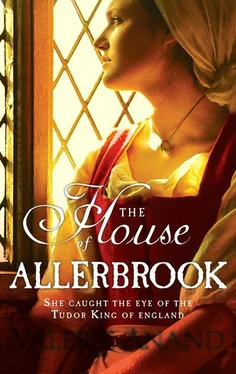1 ...8 9 10 12 13 14 ...25 “It’s the queen!” he said.
“The queen?” Eleanor asked. On the stairs behind Francis, Peggy and the maids appeared, eyes wide.
“She’s been arrested,” said Francis. “Dulverton’s buzzing with it. There’s been a King’s Messenger with a proclamation. Queen Anne’s in the Tower of London, charged with treason. For taking lovers. She’s going to be tried. It’s a capital charge. It…it’s…”
“But that’s incredible!” said Eleanor, shocked, her languor quite vanished. “She’s…the queen! ”
“The king’s wanted to get rid of her ever since she lost that last pregnancy, the one she must have started last summer, on progress. Ralph Palmer knows all the gossip. He went to London again in February to see his cousin Flaxton and he told me the rumours when he visited us last month. I doubt if anyone will ever know the truth, but I wouldn’t place any heavy bets on her being found innocent,” said Francis. “Even if she is.”
There was a silence. Then Eleanor said, “What about our chaplain?”
“Dr. Amyas Spenlove will join us in a few days. He was chaplain to a man who recently died and made him the executor of his will. He has business to finish before he leaves Dulverton. You’ll like him, I think.”
“We’ll be glad to see him. But this news about the queen,” said Eleanor. “It’s dreadful!”
For the rest of her life Jane was ashamed of the thoughts that went through her head as she sat listening.
If there is no queen of England, then there’ll be no need for ladies-in-waiting or maids of honour. I can stay here .
In the days that followed, news came in successive waves, like a swiftly rising tide.
King Henry, determined now to rid himself forever of the harpy into which his once-adored Anne had turned, wanted his subjects to understand why he was ridding himself of her and how, and wanted them to know, too, that the new marriage he had in mind was lawful. King’s Messengers and town criers were kept busy. Vicars, too, took up the task, repeating the latest announcements from their pulpits. Even the Gypsies who wandered the roads and the charcoal burners who often spent weeks deep in the forests encountered the news before many days had passed.
Yes, the queen was in the Tower. She had been tried, along with her so-called lovers. One of them was her personal musician, whose name was Mark Smeaton. Another was her own brother George. She had been accused of incest as well as adultery. They had all been sentenced to death. The men had been executed but the queen was still alive.
Queen Anne, the last to die, went to the block on Tower Green on May 19. She was executed with a sword, wielded by a professional headsman brought from France for the purpose on Henry’s orders. There was no professional headsman in England accustomed to use the sword, and executions by axe could be very butcherly. Sometimes it took several blows to finish the victim off. The sword, properly handled, was instantaneous.
Cynical people remarked that King Henry evidently wished to be as merciful as he could—as long as he wasn’t left with a living ex-wife whose existence might call the legality of a new marriage into question.
He had enough of that with Queen Catherine , said the knowing voices in the taverns and marketplaces. Well, Catherine of Aragon is dead now, poor soul, and so is Nan Bullen. Never cared for the Bullen witch myself, but I don’t think she got justice .
Nor me. Can’t believe she ever went with her brother, or played the fool with some court minstrel. I mean, I ask you, five of them! If it were just one, well, a fellow might believe it, but five—and her the queen, and adultery for a queen is high treason! She’d have to be out of her mind .
Ah. You’re right there. Whatever next, that’s what we’re all wondering .
Jane heard of the queen’s death from Father Anthony Drew, the vicar of Clicket, on the Sunday following, and shuddered. That Sunday was a particularly lovely May day, more beautiful even than the day when Francis had brought home the news of the queen’s arrest. Rain in the night had been followed at daybreak by drifting early mist and then sudden, lavish sunshine. The tree-hung ride down the combe to Clicket was dappled with it, as though by a scattering of gold coins, and vegetation was growing almost while one watched. Long grass and cow parsley and red valerian overhung the edges of the lanes and the meadowsweet had come out early. May was no month for dying.
Whatever next? Everyone was asking that, and the answer came soon enough. On May 20, the day after Queen Anne’s head had rolled into the straw, King Henry had been betrothed to her former lady-in-waiting Jane Seymour.
On May 30, he married her.
Francis and Jane heard the wedding announced by the Dulverton town crier. Eleanor was not with them. She had of late seemed more and more out of sorts and now they knew why. She had been with child, but something had gone amiss and she had miscarried. She was in bed, with Peggy looking after her, while the new chaplain, Dr. Spenlove, took charge of the house. He was cheerful and competent and had very quickly established himself as someone who could deputize for Francis when required.
“It’s a relief to have him,” Francis said to Jane. “I feel easy about going to Dulverton, and I really must. I’ve half a dozen things to do there. Come with me.” And with that, they set off on the seven-mile ride to the little town, among other things to order supplies of wine from a vintner there, and buy linen to make new shirts for Francis.
On arrival, they heard the loud bell and the stentorian voice of the crier and went toward the sound. They sat on their mounts in the midst of a crowd, listening. When the crier ended his announcement of King Henry’s new marriage, Francis, turning to Jane, said something that terrified her.
“So the new queen’s one of the old one’s ladies-in-waiting. It’s a thousand pities Sybil didn’t behave herself better, or you weren’t a bit older. If one of you had been at court, why, the next queen could have been you!”
He wasn’t joking. Jane knew it at once. He meant what he said. He was harbouring hair-raising ambitions. He was seriously imagining himself as the brother-in-law of King Henry, with one of his sisters on a throne.
“It might be dangerous,” she said, and knew that her voice was trembling. “Look what happened to Queen Anne!”
“Well, I don’t believe it would ever happen to you, though I can’t say the same of Sybil,” Francis said. “Everyone says there was no truth in the charges, but who can really know? Maybe there was.”
“Even with her own brother?” said Jane.
“Yes. I grant you that’s hard to believe,” Francis agreed. “But all the same, I feel that perhaps Queen Anne was…shall we say, not quite trustworthy. What happened to her isn’t likely to happen to anyone else.”
They rode slowly homeward, their various purchases stowed in saddlebags. The moorland tracks were narrow, but when Jane saw a chance to edge her pony up alongside Francis, she seized it.
“Francis, I want to ask you something.”
“Of course. What is it?”
“Please can you tell me how Sybil is? I haven’t seen her or heard a word about her since she went away. The Lanyons haven’t visited us, but I know you’ve seen Master Owen, more than once. I heard you tell Eleanor you’d seen him last year at a fair somewhere….”
“Dunster,” said Francis. “Where the castle is. During the fair, Owen and Katherine dined at Dunster Castle as guests of the Luttrell family. Owen’s a successful man these days.”
Читать дальше












